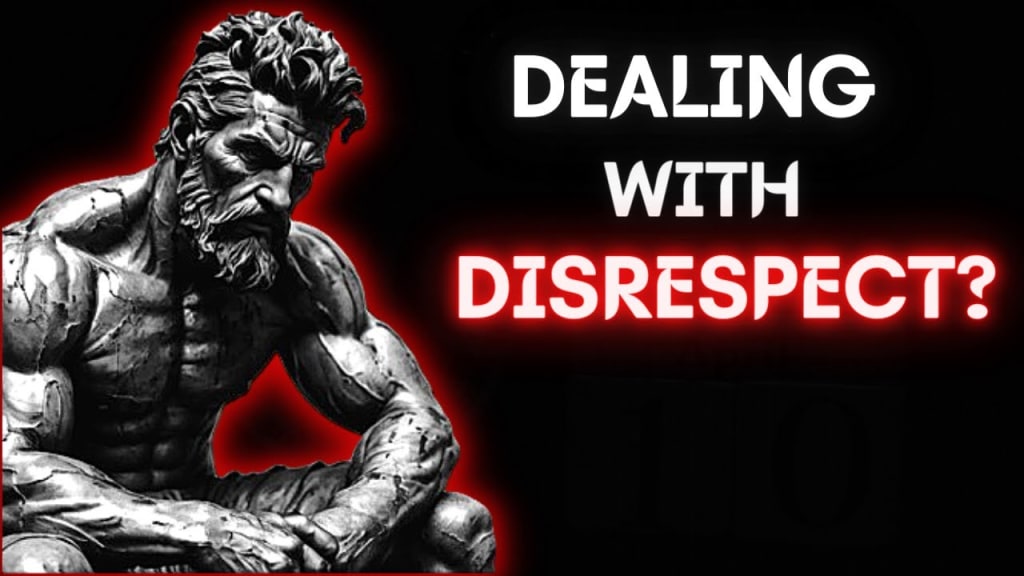STOIC LESSONS TO HANDLE DISRESPECT- Personal Development
8 stoic lessons to handle any conflict- Personality Development

Another lesson on personal development...
How does one navigate instances of disrespect? This question holds immense significance because if there's anything an individual might sacrifice their entire life for, it's enduring disrespect. People often assert that women are emotional while men are logical. However, when faced with disrespect, men often abandon all logic. This phenomenon is frequently observed, such as in road rage incidents where a minor issue leads to men engaging in physical altercations as if there's no tomorrow.
In the harsh reality worldwide, countless individuals languish in prison cells, their freedom forever lost due to mishandling disrespect. It's easy to pass judgment on these men, but sooner or later, everyone faces a test. Someone might say something to you or your loved ones that triggers intense anger, tempting you to react irrationally.
The Stoics devised a solution to address this challenge. In this article, we'll explore eight Stoic lessons for handling disrespect. It's crucial to read until the end, as the last lesson might be the most pivotal.
1. REMAIN CALM AND DO NOT RETALIATE
When someone disregards or insults you, the temptation to let anger take over and seek revenge arises. However, reacting aggressively, even if the urge feels justified, typically exacerbates the situation in the long run. Instead, it is crucial to remain calm, take a deep breath, and detach your emotions from the situation. By doing so, you gain a zoomed-out perspective, as if observing pieces on a chessboard. This clarity helps you realize that, more often than not, the situation is not worth a response.
It's important to recognize that the disrespectful act itself is not inherently harmful or offensive. The harm comes from our interpretation and thoughts about the disrespect, triggering feelings of hurt or anger. When someone disrespects you, it's essential to remind yourself that their behavior reflects their own thoughts and opinions, not a divine judgment of your true value. Their negative opinion is ultimately meaningless, as they are not the arbiters of your worth.
This shift in perspective allows you to maintain inner calm and respond more rationally, if a response is even necessary. It is not about tolerating or accepting disrespect, but handling it with self-control and dignity. By remaining calm, you demonstrate that you are not easily swayed by external events.
2. SET CLEAR BOUNDARIES
Stoicism goes beyond endorsing passivity or becoming a doormat. When faced with disrespect, there's no need to silently endure it, nor should one respond with uncontrolled anger. It is possible to be both calm and assertive. Establish clear boundaries that safeguard your dignity, and when someone crosses those boundaries, communicate what was done wrong and how you expect to be treated.
Maintaining strong eye contact during this communication is helpful. Avoid looking at the ground or breaking eye contact like a coward; instead, be firm with the gaze of a lion. This immediately conveys that you are serious about your boundaries and that you have self-respect. It signals to others that you demand to be treated with respect, regardless of the circumstances.
3. REFLECT ON YOURSELF
Many individuals tend to blame others, always attributing fault to someone else and rarely acknowledging their own mistakes. It is crucial to engage in continuous self-reflection and maintain brutal honesty with oneself. Take a moment to assess if you have done something that triggered disrespect. Ask yourself questions like, "Is there any truth in what the person said or did?" or "Did I say or do anything that contributed to this situation?"
In this introspection, you may realize that you've made a mistake, and a simple apology could help de-escalate the situation. Always engage in self-reflection; it provides a deeper understanding of the event and your own role in it.
4. CONSIDER THE SOURCE
When faced with insults or demeaning remarks, take a moment to reflect before reacting. Consider whether their behavior is a reflection of their own pain, insecurity, or ignorance rather than an accurate judgment of you. It's essential not to take brief interactions personally. As cynically stated, "He who takes offense when no offense is intended is a fool, yet he who takes offense when offense is intended is also a fool." The wise response is to ignore insults.
What people attack in you often mirrors what they attack in themselves, so let these negative remarks roll off your back. Instead, approach the situation with compassion, recognizing that some people harbor self-hate.
5. ACCEPTANCE
Regardless of who you are, disrespect is an inevitable part of life, encountered from childhood to old age. No matter how kind or strong you may be, everyone faces disrespect at some point. Escaping it is impossible because disrespect is an inherent aspect of life. Accepting this reality is crucial, focusing on what you can control. The true power lies in how you respond to disrespect.
Recognize that while you cannot control how others treat you, you have the ability to decide your reaction to disrespect. This mindset liberates you from the unnecessary burden of anger and resentment. Embracing the stoic principle of acceptance means actively choosing not to be unsettled by disrespect. It allows you to concentrate on what truly matters, channeling your energy into areas where you can make a difference. Life's challenges, including disrespect, are not insurmountable obstacles; they present opportunities for personal growth and self-mastery.
Employing humor as a response to disrespect is a subtle yet powerful art, often underestimated. It serves as a valuable means to diffuse tense situations. Imagine encountering disrespect, and instead of responding with anger or defensiveness, you choose to be light-hearted, offering a funny and witty joke. This touch of humor effectively shifts the energy of the interaction.
By responding in a lighthearted manner, you convey that you harbor no ill intentions, making the person who disrespected you feel awkward. This approach reflects an understanding that people often exhibit disrespect due to their own insecurities or frustrations. A humorous response can catch them off guard, leading to a positive change in the dynamics of the conversation.
Using humor in such situations demonstrates emotional intelligence and self-control. It signifies a choice to rise above negativity and create a more positive atmosphere, even in the face of disrespect. The goal is not to belittle or dismiss the disrespect but to diffuse tension and foster more respectful and productive interactions. This practice showcases your ability to maintain composure and respond creatively.
7. PRACTICE ACTIVE LISTENING
It may sound unconventional, but at times, the most effective way to handle disrespect is to simply listen. Listening to the disrespectful person allows you to gain a better understanding of their concerns and issues. Active listening is a powerful skill that involves tuning into the other person's concerns, even if their delivery lacks respect. Instead of reacting defensively or shutting them out, try actively listening.
The goal is to comprehend the root of their concerns, even if masked by disrespect. By doing this, you demonstrate a desire to see the bigger picture. Active listening enables you to peel back the layers of disrespect and uncover the underlying issues. This stoic approach does not condone or excuse disrespectful behavior; rather, it aims to foster understanding and empathy.
Through active listening, you convey that you are not allowing their negative behavior to trigger a defensive reaction. Instead, you respond with curiosity and compassion. Admittedly, this is not an easy task; it requires a stoic mindset and emotional intelligence. However, if you manage to do so, you may uncover issues that would have remained hidden otherwise.
Keep in mind that sometimes a person may have valid reasons to be upset, but their emotions can cloud their delivery.
8. CHOOSE FORGIVENESS
When faced with disrespect, the common reaction for many is an explosive burst of anger. However, a more superior option lies in choosing forgiveness. Stoics believe that forgiveness is not a favor bestowed upon others; rather, it is a gift you give to yourself. Consider this: holding onto resentment is akin to being chained, and despite feeling justified, the reality is that resentment only constrains you, not anyone else.
Forgiveness emerges as the true key to inner peace and happiness. Though not always easy, it is a process that, over time, allows you to let go of negative emotions that harm you more than anyone else. It's important to understand that forgiveness doesn't necessarily entail forgetting what happened; instead, it involves choosing to release emotions that have a detrimental impact.
The act of forgiveness should be approached with wisdom, compassion, and justice. It is not a sign of weakness but, rather, an embodiment of strength. Forgiveness is not surrender; it is victory. It is not a sacrifice but, rather, a rewarding act. Ultimately, forgiveness stands as the ultimate act of self-care, personal development, and growth.
About the Creator
Salman siddique
Hello Everyone!
I write interesting stories






Comments (2)
Nice work
You're doing amazing work